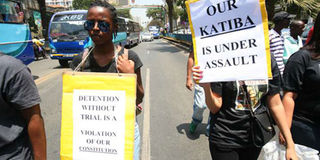Youth should oppose oppressive laws

Activists demonstrate in Nairobi on August 27, 2015 to mark the fifth commemoration since the promulgation of the Constitution. Bad laws vitiate the human rights gains secured in progressive legislations like our Constitution. PHOTO | EVANS HABIL | NATION MEDIA GROUP
What you need to know:
- KFCB’s Draft Bill was a backward document that sought to make possible punitive interventions that would repel practitioners.
- Unfortunately, widespread apathy prevents youth from sustained engagement in the country’s political apparatus and discourse.
The thing about bad laws is that sooner or later, they afflict the lives of the most vulnerable groups in society — youth and women.
In the past five years, Kenyans have witnessed successive attempts to violate the prevailing progressive spirit of the Constitution.
This has been done through the introduction of laws that are subtractive of the fundamental liberties that we enjoy as citizens.
The latest of these disastrous laws is the Kenya Film and Classification Board (KFCB) Draft Bill that was recently withdrawn after a wave of criticism.
The ICT Practitioners Bill was equally problematic.
Encouragingly, it was rejected by the government in August this year.
There are common alarming threads to be noted in these two failed legislations.
First is that both of them lacked stakeholder participation in their legislative process.
In both cases, practitioners complained that they were excluded from the drafting process.
Film and theatre practitioners criticised the manner in which the draft law seemed to have been arrived at — through boardroom meetings.
In a memorandum presented to Parliament in July, ICT practitioners also complained that they were not involved in the legislative process.
However, this was a Private Members Bill and, given the manner of parliamentary proceedings, public participation was to commence after it had been tabled.
RETROGRESSIVE LAW
Second, both were incongruent with the spirit of the Constitution.
Article 33 (1) (b) explicitly grants freedom of artistic creativity.
Article 24 is also clear on the manner in which fundamental rights and freedoms might be limited.
Third, both documents suppress innovation, entrepreneurship, and the realities of creative and ICT practice.
KFCB’s Draft Bill was a backward document that sought to make possible punitive interventions that would repel practitioners, hence discouraging entrepreneurship and innovation.
Primarily, the registration and licensing of practitioners, according to the ICT Practitioners Bill, would have locked out millions of Kenyans, mostly youth, from engaging in any kind of ICT work.
With this juxtaposition in mind, it is important to appreciate that most of the practitioners in the ICT and creative sector are the youth.
Hence, more than any other category of citizens, these bad laws would have affected them.
There is insufficient articulation of the immediacy with which creative sector and ICT practitioners should bring to the fore their liberties as prime civic rights concerns.
For the government, a policy lacuna always presents an opportunity for the introduction of broad, repressive laws that contract the civic space.
Unfortunately, widespread apathy prevents youth from sustained engagement in the country’s political apparatus and discourse.
Young people have adopted a discouraging distance that is aloof from human rights discourse.
COME OUT, ENGAGE
A disengaged opposition to bad laws that contract the liberties of artists and ICT professionals through hashtag activism does not substitute real engagement.
The role of social media in contemporary protests cannot be gainsaid, but if young people do not physically come out to spaces where critical issues are articulated, then Facebook and Twitter remain just that — chambers of uproar.
What social media provides is a platform for reactionary engagement following prolonged backbench spectatorship to legislation while what is really needed is active disruptive participation in legislation and governance.
As practitioners in these two sectors, young people need to own the processes through which these industries are regulated.
The articulation of these legislations should be originated and owned by them and not the government.
Many of the comments on social media reveal a narrow interpretation of the bad laws, particularly their chilling effect on the freedom of expression and that of the media.
Hence it has not been surprising that certain artists have ill-advisedly kept away from the KFCB Bill debate as they do not see how it directly affects their practice.
Young people need to realise that by concertedly and disruptively opposing such repressive laws, they are carrying out a significant political role as active citizens.
Bad laws vitiate the human rights gains secured in progressive legislations like our Constitution.
Intellectuals also need to articulate these concerns as issues that must be responded to seriously to secure freedoms.
Mr Ongere works for Article 19 Eastern Africa. [email protected]




